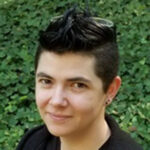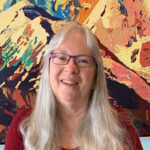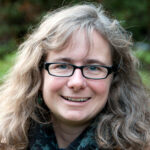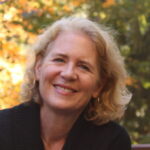Spring 2021
2
Our Paper Anniversary:
A Year of New Chapters
RWW Faculty
Our Paper Anniversary:
A Year of New Chapters

Keats Chaves
Editor
Class of 2022
It’s traditional to give a gift of paper at a one-year anniversary—a symbol of the blank pages waiting to be filled with what’s ahead—and, as writers, this feels particularly fitting now. This is exactly one year after the start of the coronavirus pandemic, exactly one year after all of our lives were changed by quarantine, social distancing, and the loss of loved ones. To mark this occasion, Peggy Shumaker, Rick Barot, Wendy Call, and Suzanne Berne speak to how this has affected them and their approach to craft. In four individual and poignant micro-essays, they each reflect on loss and hope, and give voice to the ways in which they—and all of us—are choosing to fill those blank pages to come.
Germination of Hope

Peggy Shumaker
Faculty
Maybe it’s where I am in life, past middle age, relatively healthy but amply scarred, but people I love are disappearing fast. Here’s a partial list of those I love who in these last months have finished breathing on this earth: Jon, Burns, Marilyn, Glen, Terrence, Marvin, Barry, Jean, Sherry. Grief has crushed me. I take my beloved to dialysis, to the oncologist, to the cardiologist. Masked, I wipe down the grocery cart during geezer hours, and pick up halibut and romaine. While I walk and walk and walk, I’m visited by the elegiac impulse. It’s not just a matter of eulogizing lost ones, though that seems fitting. It’s also looking at our shared awareness of death. What does that mean to how we live? In this moment, culturally and artistically, how are we taking care of one another? How are we dealing with the aftermath of wildfires? How are we dealing with those who do not share our awareness? I have written one overt catalogue in honor of the dead (the overt part unusual for me). Each of us knows someone who has to put their life at risk to get treatment for something unrelated to the virus. I have a poem dealing with that. I’ve written a poem focused on the moment someone you love signs a Do Not Resuscitate order. No matter how appropriate that act may be, it’s wrenching. I’ve written to my senators, drafted op-ed columns, been active in the effort to recall the governor of my state. I have the luxury of being home, mostly. I have a warm place to sleep and good food to eat. My privilege is immense. From the ashes of the last four years, I witness the germination of hope.
Elemental Things
![Rick Barot [Credit Rachel McCauley] Rick Barot [Credit Rachel McCauley]](https://www.rwwsoundings.com/wp-content/uploads/bb-plugin/cache/Rick-Barot-Credit-Rachel-McCauley-150x150-circle-3c74a29d2466b06b5e5e0d2af1198aea-604fecb9b8658.jpg)
Rick Barot
Director / Faculty
Mostly I’ve been thinking about love and time and place—elemental things—and the kind of attention I give to them, especially the attention I give to them in my poetry.
Allen Grossman, the poet and critic, has this notion—that the reason for poetry is that it’s a way for us to preserve the image of the human through time, that poetry is about preserving the face of the beloved. In my own thinking, I’ve been enlarging Grossman’s idea so that poetry isn’t only about preserving the human beloved. The beloved can also be a principle, or the divine, or a neglected self within the self.
I’ve been thinking of what we call nature—a beloved that, though indifferent to us, seems nonetheless vexed with us, and the virus a seeming manifestation of that vexation. During the pandemic, I have gone to the beach or looked at the teeth-like mountains to the east, and I’ve been reminded that what this world creates for me is a kind of responsible wonder. That is, a wonder complicated by how the human is played out in the natural world. Further, a wonder that isn’t just about an aesthetic experience, but also a critical one—a perspective that tries to see the layers of time and history that converge in any given space and moment.
Where I am right now, for example, is a complicated place. Fifteen thousand years ago, what I now know as Tacoma, Washington, was under a glacier a mile thick. Then it became the home of numerous Native populations—the Puyallup, the Nisqually, the Squaxin Island, and Steilacoom tribes. Then it was taken and settled by white settlers. Now it’s a place that’s informed by incredible diversity, military bases, the technology industry, and the continuing demands of the human on the environment. About forty miles away from where I am is Mt. Rainier, rising 14,000 feet high, a gasping bit of awe when you see it on the rare clear day. The mountain was here 15,000 years ago, and it will still be here 15,000 years from now.
Day by day, then, the sense of the day as replete with destruction and abundance. And my mind and its poetry trying to discern the beloved in each day.
Getting Through These Times

Wendy Call
Faculty
One week into our COVID sequestration, my friend Amy Wheeler, a playwright, posed a question on Facebook: “Dear Brilliant & Beautiful Writers: How are you getting through these times?” People suggested hikes in nature, meditation, and reading more books. I was afraid to leave my yard, and couldn’t even focus on reading a book, much less meditate. I replied, “I would love to do a Zoom virtual writing date (freewriting and then quick check in)....”
Three days later, Amy and I hosted our first gathering; we decided to meet each weekday for ninety minutes. A couple of months later, we expanded it to four-and-a-half hours every Monday through Friday. Even on Good Friday, and the first and last days of Ramadan. Writers joined us from New York City through April’s long cruelty, even as they looked out their windows at refrigerator-trailer temporary morgues. Even on Memorial Day and Canada Day and Eid. We were in the middle of a Friday open mic when the news that Ruth Bader Ginsberg had left us came crashing in. We met on Yom Kippur and Indigenous People’s Day, on Thanksgiving and Christmas Day and New Year’s Eve. We began our January 6, 2021, session just as the insurrection began in DC.
No matter what, we kept writing. We have lost family members and close friends to COVID, lost jobs to the pandemic-recession, lost life partners to pandemic-stress. Still, some of us gather each day to write.
Final Drafts

Suzanne Berne
Faculty
I’ve had the good fortune, these past long months, to be working on the final draft of a novel, which has meant spending part of each day in a world that seems under control. All the big surprises are settled in a final draft: the plot twists, the fight scenes, the unveiling of secrets. The cast is assembled; the place established; even the dinner menus are set. What’s left is a housekeeper-ish “polishing,” as you pass quickly over sections that look presentable, and fixate on spots of confusion and clutter.
And yet, final drafts hold their own surprises—chiefly, that you have never controlled as much as you think. Because with the entire narrative now before you, what suddenly seem riveting are not its spectacles, the dramatic escapes and rescues, but its small, astonishing revelations.
Here’s where you notice that a character’s catchphrase, “I got it,” has weird resonance because that same character “loses it” during a breakdown toward the end. Or that the name you gave the town has a double meaning, or that a quiet gesture on the first page foreshadows everything to come. Linkages and patterns surface in moments that now feel inevitable, but would have been too neat had you planned for them. You shock yourself by the sense you have made. And to discover sense these days, even in small things, is very welcome.
Of course, final drafts often hold one more surprise, when they turn out not to be final, after all.
Author Biographies
Peggy Shumaker’s most recent book, Cairn, was published by Red Hen Press. She served as Alaska State Writer Laureate, and has received a Distinguished Artist Award from the Rasmuson Foundation, and a fellowship in poetry from the National Endowment for the Arts. Professor emerita at University of Alaska Fairbanks, Shumaker serves on the Advisory Board for Storyknife, as well as the board of the Alaska Arts and Culture Foundation. She is editor of the Boreal Books series (an imprint of Red Hen Press), editor of the Alaska Literary Series at University of Alaska Press, and contributing editor for Alaska Quarterly Review.
Rick Barot was born in the Philippines and grew up in the San Francisco Bay Area. He has published three volumes of poetry: The Darker Fall, Want, and Chord. His work has appeared in numerous publications, including Poetry, The New Republic, Tin House, The Kenyon Review, and The New Yorker, and he has received fellowships from the Guggenheim Foundation, the National Endowment for the Arts, and Stanford University. He lives in Tacoma, Washington, and directs The Rainier Writing Workshop at Pacific Lutheran University. His fourth book of poems, The Galleons, was published by Milkweed Editions in 2020.
Wendy Call is the Seattle-based co-editor of Telling True Stories, author of No Word for Welcome, and translator of In the Belly of Night and Other Poems (forthcoming 2021) by Irma Pineda. She teaches in the English Department at Pacific Lutheran University and The Rainier Writing Workshop.
Suzanne Berne is the author of four novels: The Dogs of Littlefield, The Ghost at the Table, A Perfect Arrangement, and A Crime in the Neighborhood, which won Great Britain’s Orange Prize in 1999, as well as a book of nonfiction. She has written frequently for The New York Times, and her short stories, reviews and essays have also appeared in Ploughshares, Agni, Vogue, The Washington Post, The Los Angeles Review of Books, and The London Sunday Times, among other publications. She is the fiction editor for The Harvard Review and teaches creative writing at Boston College.
